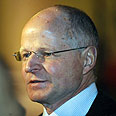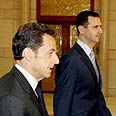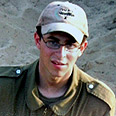
Noam Shalit in Paris this evening
Photo: AFP

Sarkozy with Assad (archive)
Photo: AFP

Gilad Shalit
Photo: Amit Magal
Noam Shalit: Sarkozy told me Gilad is alive
'We have a little more hope tonight, but things are still complicated,' says father of kidnapped soldier with cautious optimism after meeting with French president. Earlier today Sarkozy's envoy to Damascus said he has asked Syria's Assad to pressure Hamas to release Shalit
Noam Shalit, father of kidnapped Israeli soldier Gilad Shalit, said following a meeting with French President Nicolas Sarkozy that the latter told him his son is still alive.
"We have a little more hope tonight, but things are still complicated," Shalit told Channel 10 News.
Efforts
Statement released by Elysée Palace says Sarkozy to meet with Noam Shalit as part of efforts to secure kidnapped soldier's release. French president recently asked Syrian leader Assad for sign of life from Israeli captive
Earlier on Tuesday a French lawmaker sent by Sarkozy on a Middle East fact-finding mission said France has asked Syria to encourage Hamas to release Shalit.
Sarkozy raised the issue of Shalit, a dual French-Israeli national who was captured in 2006, with Syrian President Bashar al-Assad by telephone last week, French senator Philippe Marini told reporters.
Diplomats in the Syrian capital said Shalit's release was also a main focus of a visit by Sarkozy to Damascus this month during the Israeli invasion of Gaza.
"Mr. Shalit is an Israeli soldier but he is also a French national. We insist a lot on this because it is our duty to defend our citizens," Marini said.
The French senator would not drawn on whether Syria, which hosts the exiled leadership of Hamas, was exercising influence on Hamas to release Shalit, but he said a deal was needed after Egyptian mediation for a prisoner swap went nowhere.
Marini, who is well connected in Syria, hinted that Shalit's release was tied to strengthening a ceasefire between Hamas and Israel that halted the Israeli offensive in Gaza and to lifting the blockade on the strip.
Hamas cited the Israeli blockade, which has hurt Gaza's 1.5 million Palestinians, as one of the reasons for not renewing a previous "calm" with Israel last month.
"All parties must understand that (Shalit) is a very important issue for progress on maintaining the ceasefire and other discussions," Marini said after meeting Assad.
Israel believes that maintaining restrictions on Gaza's border crossings will give it leverage on Hamas to free Shalit.
The Izz al-Din al-Qassam Brigades, the armed wing of Hamas, and other Palestinian organizations captured the soldier in a raid outside Gaza.
Egypt had been mediating a prisoners' swap but Hamas and Israel disagreed on the number of Palestinians prisoners to be freed in return for Shalit.
Palestinian political commentator Ali Badwan said that Hamas was sticking to a list of 500 prisoners and that the group was against linking Shalit to a deal other than a prisoner swap.
The list includes Ahmed Saadat, head of the Popular Front for the Liberation of Palestine, and Palestinian leader Marwan Barghouthi, who was jailed for orchestrating attacks against Israel during the last Palestinian uprising.















